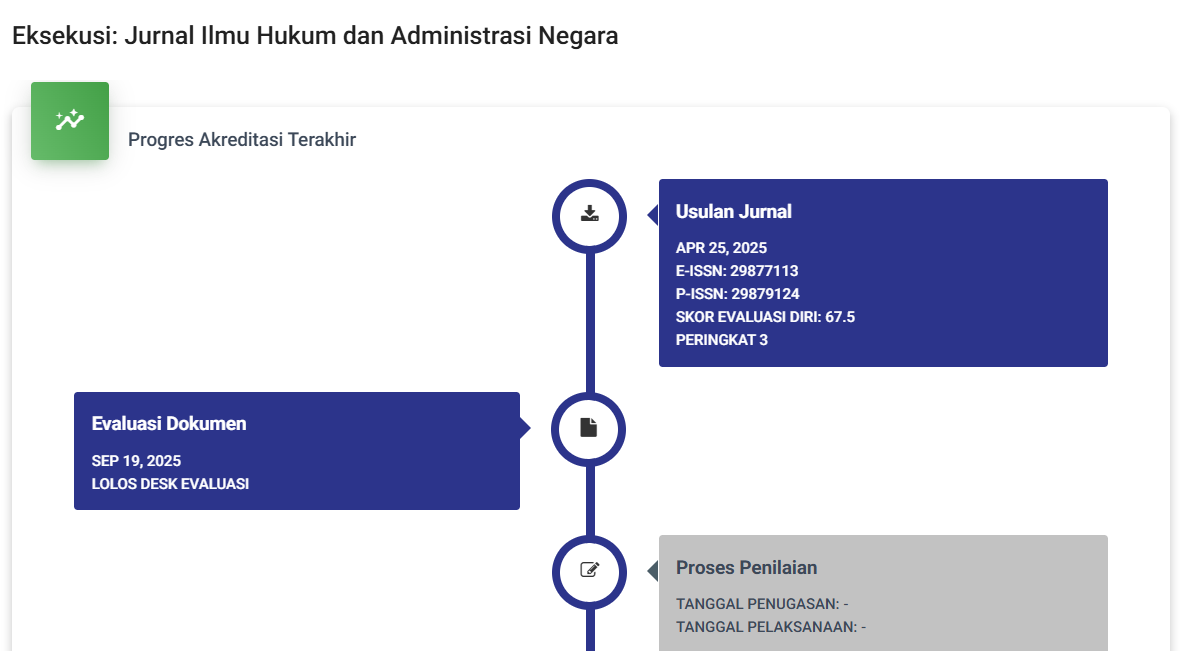Implementasi Artificial Intelligence (AI) Dalam Pembentukan Peraturan Perundang-Undangan Di Indonesia
DOI:
https://doi.org/10.55606/eksekusi.v2i1.789Keywords:
Artificial Intelligence, legislationAbstract
Utilization of Artificial Intelligence (AI) in the formation of laws and regulations and its implications for ethics and security. This article highlights the limitations of AI in interpreting data and forming algorithms, which can lead to bias and discrimination. This article also discusses the role of legal experts in ensuring the ethical and safe use of AI within statutory regulations. The article provides examples of countries that have implemented AI in their legislation, such as Canada and the European Union. The article concludes that although AI has the potential to improve the efficiency, accuracy and quality of legislation, it should be used as a tool and not replace the role of lawmakers.
References
Paulus Wisnu Yudoprakoso, “Kecerdasan Buatan (Artificial Intelligence) Sebagai Alat Bantu Proses Penyusunan Undang-Undang Dalam Upaya Menghadapi Revolusi Industri 4.0 Di Indonesia,” Simposium Hukum Indonesia 1, No. 1 (2019): 450-461., hlm. 452.
Nining Rahayu, “Mengenal Revolusi Industri Dari 1.0 Hingga 4.0,” 2019, https://www.wartaekonomi.co.id/read226785/mengenal-revolusi-industri-dari-10-hingga-40#:~:text=Revolusi industri merupakan fenomena yang,ekonomi%2C dan budaya di dunia. Diakses 19 Oktober 2023.
Febri Jaya and Wilton Goh, “Analisis Yuridis Terhadap Kedudukan Kecerdasan Buatan Atau Artificial Intelligence Sebagai Subjek Hukum Pada Hukum Positif Indonesia,” Supremasi Hukum 17, No. 2 (2021): 1-11, https://doi.org/https://doi.org/10.33592/jsh.v17i2.1287, hlm. 2.
Law Solution, “Kecerdasan Buatan (Artificial Intelligence) & Tantangan Ya Bagi Hukum Indonesia,”2021,https://ap-lawsolution.com/id/actio/kecerdasan-buatan-artificial-intelligence-tantangann-ya-bagi-hukum-indonesia/#:~:text=Secaraeksplisit%2C walaupun dapat melakukan,dapat didefinisikan sebagai subyek hukum. Diakses 19 Oktober 2023.
Eka N.A.M Sihombing and Muhammad Yusrizal Adi Syaputra, “Implementasi Penggunaan Kecerdasan Buatan Dalam Pembentukan Peraturan Daerah,” Jurnal Ilmiah Kebijakan Hukum14, No.3(2020):419 434,https://doi.org/10.30641/kebijakan.2020.V14.419-434, hlm. 420-421.
Indra Cahya, “Upaya Apple ‘perang’ Kecerdasan Buatan Lewat Siri,” 2018, https://www.merdeka. com/teknologi/upaya-apple-perang-kecerdasan-buatan-lewat-siri.html. Diakses 19 Oktober 2023.
Ibnu Sina Chandranegara, “Bentuk-bentuk Perampingan dan Harmonisasi Regulasi”, Jurnal Ius Quia Iustum Vol. 26 No. 3 (2019), hlm 436.
Lisfer Berutu, “Mewujudkan Peradilan Sederhana, Cepat Dan Biaya Ringan Dengan e Court,” Jurnal Ilmiah Dunia Hukum 5, no. 1 (2020): 41–53.
Esther Salmerón-Manzano, “Legaltech and Lawtech: Global Perspectives, Challenges, and Opportunities,” Laws 10, no. 2 (2021): 24.
Joenaidi Efendi and Johnny Ibrahim, Metode Penelitian Hukum (Normatif Dan Empiris) (Jakarta: PrenadaMedia, 2018).hlm 132.
Lexy J. Moleong, Metodologi Penelitian Kualitatif (Edisi Revisi) (Bandung: Rosda, 2017).
Lihat Cynthia Hadita, “Regional Autonomy Political Politics of Regional Liability Reports to Regional Representatives in The Implementation of Local Government,” Nomoi Law Review 1, no. 1 (2020): 90.
Yudoprakoso, Paulus Wisnu. “SIMPOSIUM HUKUM INDONESIA.” KECERDASAN BUATAN (Artificial Intelligence) SEBAGAI ALAT BANTU PROSES PENYUSUNAN UNDANG-UNDANG DALAM UPAYA MENGHADAPI REVOLUSI INDUSTRI 4.0 DI INDONESIA, vol. 1 Nomor 1, 2019, p. 452.








